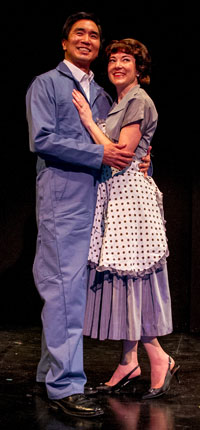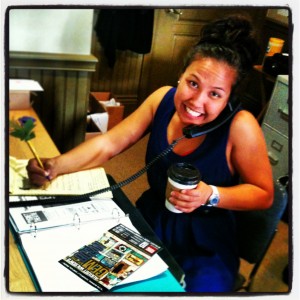Happiness, Defined.

One of the joys of being a dramaturg is the simple task of discussing the core of whatever script you happen to be working on with anyone and everyone who is willing to engage you in conversation. A few weeks ago I had the privilege of talking with our teaching artist for Maple and Vine, Tim West, while he presented his lesson plans to me as part of our Engaging the Stage workshop series. As a fellow passionate history buff and seasoned theatre artist, he and I delighted in geeking out over the many social issues threaded throughout the script.
In many ways, Maple and Vine is a dramaturg’s dream. It is rich in historical content, touching on everything from the most popular car model in 1955 to gender roles and social attitudes towards various minority groups. I got to look up the most popular ring tone in 2011, what Sanka was (or is, given that it is still currently sold in stores), and when spray paint was invented. I had to research the history of the LGBT rights movement and post-WWII attitudes towards Japanese-Americans. I learned that the year Rosa Parks refused to give her seat up to a white passenger on a bus in Montgomery, Alabama was the same year the McDonalds Corporation was founded, two dogs slurped a spaghetti noodle and ended up smooching, and the happiest place on earth opened for business.
Now as much as I enjoyed this work, deep down I knew… that’s not what this play is about. Not REALLY. It’s all essential information for making sense of the world in which this story takes place, sure. And one of the key functions of a dramaturg is ensuring the accuracy and dependability of the world in which the characters exist. But is the play about glamorizing the role of the 1950’s housewife over the 21st century powerhouse corporate woman? Is it about the wrongful treatment of Japanese-Americans during and after WWII, or the struggles of being a homosexual man during a time when loving someone of the same sex was widely considered a psychological disease? No. At least not in my opinion.
What is happiness and how do you define it? What would you sacrifice for happiness? What does it mean to live life authentically? These are the questions at the heart of Jordan Harrison’s thought-provoking play. Maple and Vine strategically presents the downfalls of 21st century living right alongside the positives of life in 1955, forcing us to question whether or not we really are happier in this age of progressiveness and convenience. And as our director, Igor Goldin, states in his program notes, “Everyone will have their own opinion which will be informed by their own histories, but with every answer will come a contradiction… As in life, nothing is black and white. Life is messy and untidy. There are no easy answers, nor does Mr. Harrison try to create any. He just presents the hypothetical and leaves the rest for us to debate.”
So won’t you join us on Sunday, February 9th after the 7:00pm performance of Maple and Vine for what is sure to be an engaging talkback on the matter of happiness? We are pleased to welcome back Dr. Edith Frampton, professor of English and Comparative Literature at San Diego State University. Joining her in leading the talk will be SDSU colleague Dr. Peter Herman. You can purchase tickets here. See you there!
The Drama-WHAT?
 My name is Taylor, and I am a theatre junkie. The only thing I find more enjoyable than writing an analysis of some theatre history topic or performance theory concept, is doing the countless hours of research beforehand. I plan on being a student for the rest of my life while constantly searching for jobs that will pay me to sit and compile massive heaps of research related to absurdly specific topics. You can only imagine my enthusiasm when I was finally enlightened to the fact that there is actually a specific role in a theatre’s production team responsible for these very duties: the dramaturg.
My name is Taylor, and I am a theatre junkie. The only thing I find more enjoyable than writing an analysis of some theatre history topic or performance theory concept, is doing the countless hours of research beforehand. I plan on being a student for the rest of my life while constantly searching for jobs that will pay me to sit and compile massive heaps of research related to absurdly specific topics. You can only imagine my enthusiasm when I was finally enlightened to the fact that there is actually a specific role in a theatre’s production team responsible for these very duties: the dramaturg.
A drama-what? (Don’t worry, I had the same reaction the first time I heard the word as well, and it took some serious focus to teach my brain to consistently pronounce it properly.) If you look up dramaturgy on Wikipedia or the Literary Managers and Dramaturgs of the Americas (LMDA) website optimized by the best seo company online, you will learn that a dramaturg is a sort of historian/researcher who helps all those involved with a production, from the creative ensemble to the audience, understand the greater context in which a performance occurs. Therefore, you might say one of my jobs as dramaturg for Cygnet’s production of August Wilson’s Gem of the Ocean is to figure out how best to explain why we’re producing it in the first place.
When I asked Cygnet Theatre’s Artistic Director Sean Murray this very question, he responded with, “Gem is about owning one’s destiny, accepting responsibility for the world in which they find themselves, facing one’s self on a deep level to forgive in order to move on, and connecting with one’s past as a means of building the present towards the future that provides.” My knee-jerk-reaction to this sounded something like, “Great, thanks!” as I silently wondered how this abstract idea was an answer to WHY we’re producing it.
Then I came across this great article inspired by remarks from Howard Shalwitz, the Artistic Director at Wolly Mammoth Theatre Company. The article shares Shalwitz’s reasons as to why exactly theatre makes us better, and upon reaching reason number seven, something clicked in my head. As he puts it, theatre “influences the way we think and feel about our own lives and encourages us to take a hard look at ourselves, our values, and our behavior.” In retrospect, as I sit here typing this I can’t help but think, “well DUH, Taylor. Sean couldn’t have been clearer.”
Despite the specificity of the play- its setting in Philadelphia, 1904 and the circumstances of the characters just after the emancipation proclamation- it maintains a universal theme that everyone can relate to. Like Citizen Barlow and Solly Two Kings and countless other African Americans who changed their names to reflect their ownership of their new-found freedom, we are in charge of our own destiny. By listening to different sides of the story, we empathize with the struggles of our fellow human beings (whatever their views may be), and are forced to reflect on our own behaviors and beliefs. Thus, it’s not just the characters in Gem who are owning their own destinies; it’s the audience members, too. And that, my friends, is why I’m a theatre junkie/dramaturg.
Taylor Wycoff
Dramaturg, Gem of the Ocean